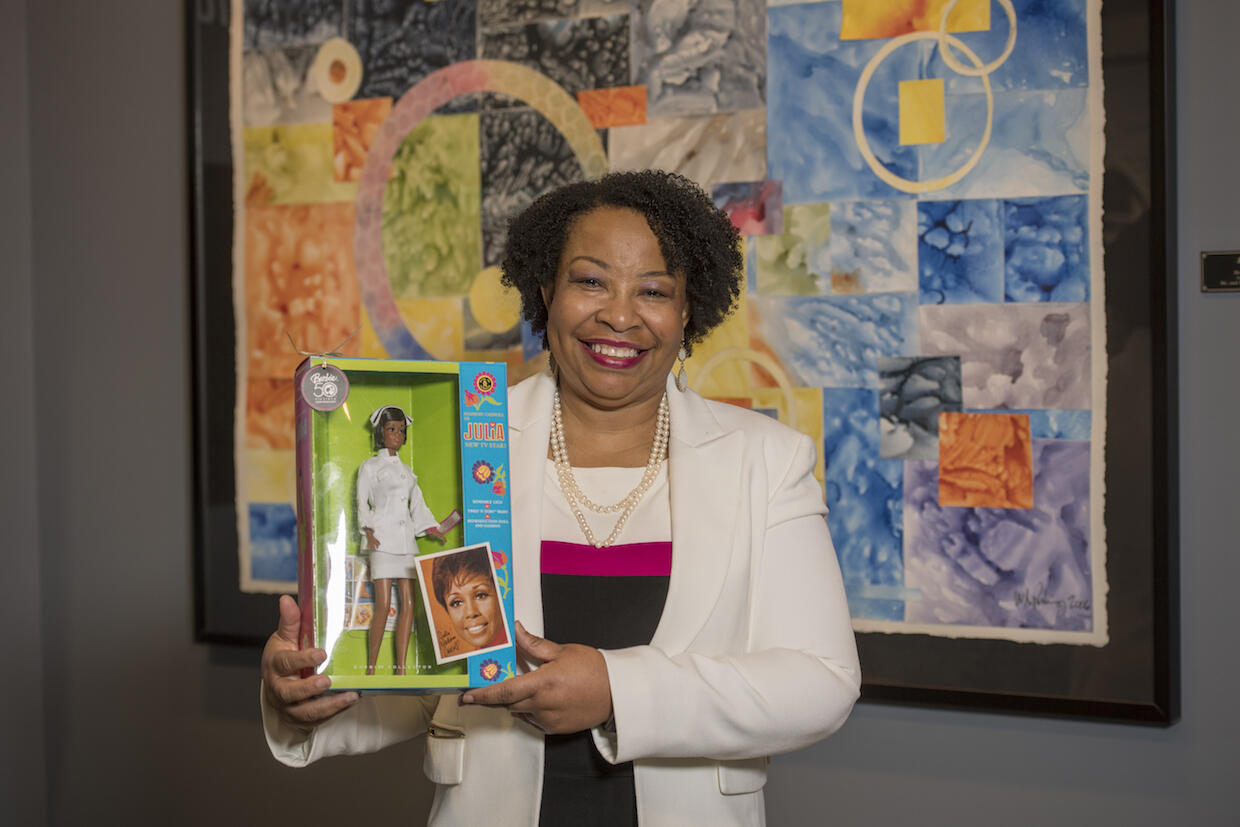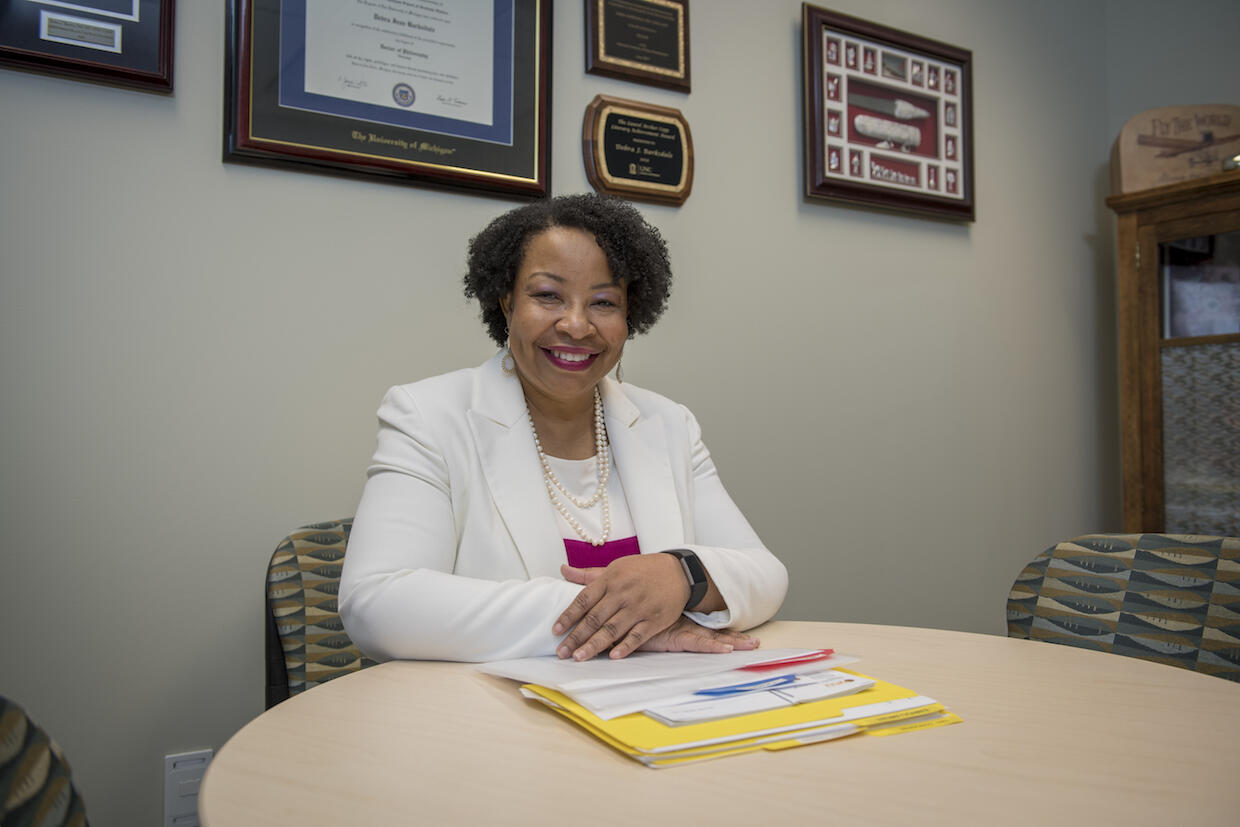
Feb. 28, 2018
A TV show inspired Debra Barksdale to become a nurse. She did the rest.
Share this story
Debra Barksdale grew up in rural central Virginia. Her father, George, was a tobacco sharecropper with a third-grade education; her mother, Dorothy, completed high school and worked in a garment factory. Their daughter was 9 years old when she decided she was going to be something different.
Her inspiration: a 1960s TV show called “Julia” starring Diahann Carroll as a nurse.
“I think it was one of the first TV shows where the main star was a woman of color,” said Barksdale, Ph.D., the associate dean of academic affairs in the Virginia Commonwealth University School of Nursing and a Nursing Alumni Endowed Professor.
Barksdale, who today has published studies funded by the National Institutes of Health and sits on the board of governors of the Patient-Centered Outcomes Research Institute, remembers watching “Julia,” which ran for 86 episodes from 1968 to 1971, on a black-and-white TV, fiddling with the antenna to get adequate reception.
“We didn’t have books. I didn’t have role models or parents who were college educated,” Barksdale said. “And I decided I was going to be a nurse. That was pretty much it. I made up my mind.”
‘I was poor, but I never felt poor’
Barksdale, who came to VCU in 2016 after a 14-year career at the University of North Carolina at Chapel Hill, is sitting in her office, a tidy, light-filled room on the fourth floor of Sadie Heath Cabaniss Hall on the MCV Campus.
Degrees and awards hang neatly along the far wall. Keepsake items rest on shelves in the left corner. In the right corner, atop a tall wooden cabinet, sits a boxed “Julia” doll, created by Mattel Inc. in 2009 as part of Barbie’s 50th anniversary. Barksdale has pulled the box off the shelf and set it on a small table where she sits.
“Somebody gave me this after I did a TED talk a few years ago and I talked about ‘Julia,’” she said.
“Julia” is only part of Barksdale’s story. She grew up the second of five children in Nathalie, in Halifax County. Her family was always moving, from one old rental house to the next. She was 16 before she lived in a home with running water and plumbing. It was less than 1,000 square feet in size and had one bathroom. It was the first house her parents owned. They still live there.
Most people in Nathalie, Barksdale said, were not highly educated. She wanted to be different. She loved to read. She learned to write by copying the labels on canned foods. When she was in high school, her parents purchased a set of encyclopedias. Barksdale was in heaven. She read the encyclopedias. She read the dictionary. She read whatever she could get her hands on.
“I remember when I was very young, my other sisters liked to cook and I would be studying or reading something,” Barksdale said. “My father said something like, ‘When you get married, you’re gonna need to know how to cook.’ And I said, ‘Well, we'll eat bologna sandwiches,’ because I had no interest.”
The family was poor, she said, but she didn’t feel poor.
“We always had clothes — my mother was a seamstress — and plenty of food and gardens and pigs and stuff like that,” Barksdale said. “At that point I didn’t understand what it meant to be poor — I was poor, but I never felt poor. We always had everything I knew of that we needed, like food and clothes and each other."
Rising from the mud
Barksdale has never tried to hide details about how she grew up. Her TED talk, “Rising From the Mud,” focused on finding inspiration from the past.
“Some people don’t want to acknowledge their background, especially when they come from lower socio-economic backgrounds. But Debra is the opposite,” said Coretta Jenerette, Ph.D., an associate professor in the School of Nursing at the University of North Carolina at Chapel Hill.
Jenerette first met Barksdale in 2007. Barksdale, she said, has played a big role in her personal and professional development as a friend, colleague and mentor.
“I’m from rural South Carolina, a little place called Hemingway, in Georgetown County,” Jenerette said. “My parents didn’t have a high school education. My high school class was 50 people. [Debra] and I share similar backgrounds. And I think it adds to her authenticity [that] she’s not ashamed to say she came from a low socio-economic background in a rural area. It allows her to better serve people that reflect her background.”
We didn’t have books. I didn’t have role models or parents who were college educated. And I decided I was going to be a nurse. That was pretty much it. I made up my mind.
Barksdale, who holds nursing degrees from the University of Virginia, Howard University and the University of Michigan, studies stress and cardiovascular disease in black American adults. She chose this field for several reasons, she said.
“Usually when someone had died, like my grandfather, they had a stroke or something of that nature,” Barksdale said. “I knew high blood pressure was a problem in African-Americans, and I was always interested in the notion of stress.”
Barksdale wrote her master’s thesis on stress. When she started working as a nurse practitioner in Maryland, she would often see young black men with high blood pressure who did not fit the profile of a typical hypertension patient.
“You’re ‘supposed’ to be overweight. But they weren’t,” Barksdale said. “My husband was really lean and a runner and he had high blood pressure. I started to try and figure out what was going on.”
She has been working to better understand the connection between stress and blood pressure among African-American adults. Some of her most notable work has come through studies that monitor blood pressure at night.
Blood pressure is usually lower when you are sleeping, Barksdale said. But there are some people who don’t experience a blood pressure dip overnight.
“[They] are physiologically not hypertensive during the daytime but at night their blood pressure doesn't dip appropriately, so they are hypertensive when they sleep,” Barksdale said. “How would anyone know that? You don’t go to the doctor in the middle of the night, and if you did, you’d be awake and your blood pressure is going to come up anyway.
“Most strokes and heart attacks occur in the early morning, so it’s really consequential, whatever is happening.”

‘I can give back’
Barksdale believes she has a responsibility to help others.
“One of the guiding principles of my life is, ‘To whom much is given, much is required,’” she said.
That is paraphrased from the New Testament — Luke 12:48: For unto whomsoever much is given, of him shall be much required. Barksdale lives by this philosophy. She started a mentor leadership program when she was president of the National Organization of Nurse Practitioner Faculties. She is a graduate of the Robert Wood Johnson Foundation Executive Nurse Fellows program. She is at a point in her career, she said, when she can help people — by offering advice, writing recommendation letters, or helping someone who simply needs a role model.
“I can give back and contribute,” Barksdale said. “I’m not worried about what people think. I’m not trying to get promoted. I believe if you treat people right and try to do the best you can — and if you can get out of your own way — you can help other people.”
Jenerette said Barksdale is an example for minority faculty and aspiring health professionals.
“I’ll send her a text message and I'll say, 'Do you have five minutes?' And we'll be on the phone for a half-hour because I thought I needed five minutes but she knew I needed a half-hour,” Jenerette said. “She has a million things to do but she never makes you feel like you're not a priority.”
I believe if you treat people right and try to do the best you can — and if you can get out of your own way — you can help other people.
Barksdale’s commitment to others is sincere, Jenerette said. She treats you as though you are the most important person to her in a given moment. She isn’t distracted — no glances at the clock, or the Fitbit wrapped around her left wrist. She is present.
“I like to tell people: I like whatever I’m doing at the time,” Barksdale said. “So if I’m doing research — oh my God that’s the best thing. If I’m teaching — oh I love teaching. If I’m doing something administrative — wow.”
She glances around the room, her boxed “Julia” doll resting next to her right elbow.
“I’m still humbled knowing how I grew up and how I was raised and here I sit in an office like this,” Barksdale said. “I’m a woman of faith and I consider myself tremendously blessed.”
Subscribe to VCU News
Subscribe to VCU News at newsletter.vcu.edu and receive a selection of stories, videos, photos, news clips and event listings in your inbox.












